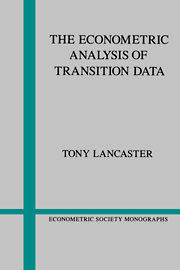Book contents
- Frontmatter
- Part I Model Building
- 1 Some Basic Results
- 2 Covariates and the Hazard Function
- 3 Parametric Families of Duration Distributions
- 4 Mixture Models
- 5 Some Important Processes
- 6 Some Structural Transition Models
- Part II Inference
- Appendix 1 The Gamma Function and Distribution
- Appendix 2 Some Properties of the Laplace Transform
- Bibliography
- Index
5 - Some Important Processes
Published online by Cambridge University Press: 05 January 2013
- Frontmatter
- Part I Model Building
- 1 Some Basic Results
- 2 Covariates and the Hazard Function
- 3 Parametric Families of Duration Distributions
- 4 Mixture Models
- 5 Some Important Processes
- 6 Some Structural Transition Models
- Part II Inference
- Appendix 1 The Gamma Function and Distribution
- Appendix 2 Some Properties of the Laplace Transform
- Bibliography
- Index
Summary
Introduction and Overview
The process of movement from state to state generates a sequence of points on the time axis - the times at which transitions are made. Since movements are probabilistic the passage of a person over time is a realisation of a stochastic, point process. There is a very large literature dealing with the mathematical properties of such processes. Much of this literature deals with the long-run or equilibrium properties when the transition probabilities are constant over time and the process is stationary. In econometrics we usually have to model processes observed over rather short periods of time and which are not stationary, so results from the theory of point processes are not directly relevant. Nevertheless some knowledge of the basic stochastic processes is helpful in thinking about the properties of econometric data as is illustrated by the following example.
Many government statistical services collect and publish information about the duration of unemployment. They obtain this by sampling the population of registered unemployed people and asking them how long they have been unemployed and then they collect the answers in a grouped frequency distribution. Table 5.1 below gives such a distribution for the UK in 1984.
- Type
- Chapter
- Information
- The Econometric Analysis of Transition Data , pp. 83 - 121Publisher: Cambridge University PressPrint publication year: 1990



